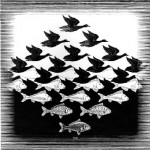Searching for Negative Space in the Constitution
 Some people dislike the game of soccer. They observe the players running around on the field and it all seems like random chaos. Soccer aficionados, however, are not focusing on the players. They are watching the spaces in between the players. These empty spaces ebb and flow, like waves in the ocean, creating momentary opportunities for the attacking side.
Some people dislike the game of soccer. They observe the players running around on the field and it all seems like random chaos. Soccer aficionados, however, are not focusing on the players. They are watching the spaces in between the players. These empty spaces ebb and flow, like waves in the ocean, creating momentary opportunities for the attacking side.
Some people dislike jazz. To them, the melody of the song gets lost in a blizzard of noise. Jazz aficionados hear something different. They are listening to what the musicians do in the spaces in between the notes of the melody.
The United States Constitution creates a positive space for government. The federal government is delegated specific powers. The governments of the states retain those powers not delegated to the federal government or otherwise retained by the people.
However, the United States Constitution also creates negative space for government. What happens when a changing world, changing social values, or new technologies cause the public to demand an expansion of government into spaces that fall in neither the delegated powers of the federal government nor the traditional realm of the states? Typically in our nation’s history, this has occurred in response to a crisis that implicates a national economic interest or a national security interest, making reliance on the individual state governments for solutions inadequate. Examples would include the Great Depression and the response to the September 11 attacks. In these situations, the federal government rushes in to fill the negative space, despite the fact that a strict reading of the Constitution does not provide for the federal authority to do so.

